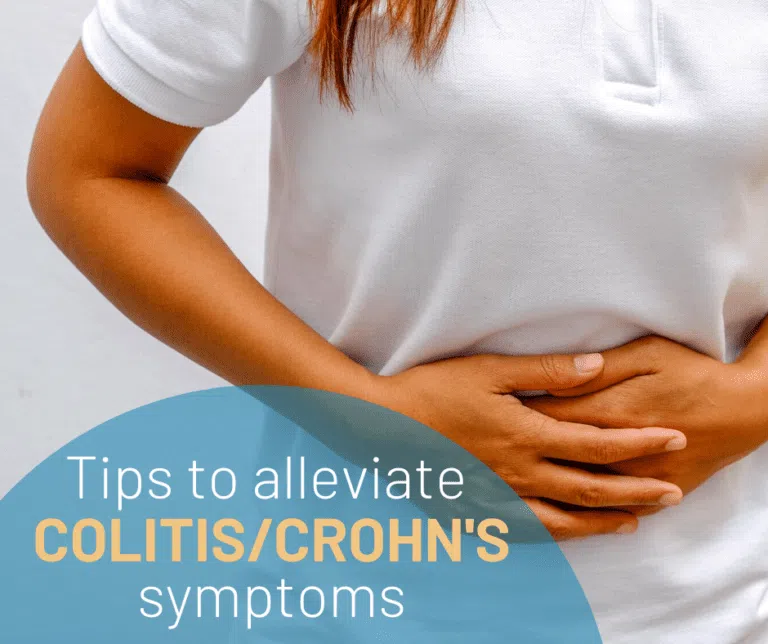Crohn’s and Colitis: Natural Treatment Options

If you are someone who experiences one of the two most common forms of inflammatory bowel disease (IBD), Crohn’s disease and ulcerative colitis, you will know that the pain and disruption caused by these disorders can wreak havoc on your life, affecting relationships, employment and more.
Unfortunately, there is no known cure for either condition, although much exciting research is being done. The good news is that we have made a lot of progress in recent years discovering natural ways to ease and support IBD. Read on to discover some non-invasive treatment modalities that can help you take your life back.
Crohn’s and Colitis- What You Need to Know
Crohn’s and Colitis develop when the lining of your intestines become inflamed. But behind that short definition lie several debilitating consequences, including difficulty with food digestion, nutrient absorption, and waste elimination. These issues can result in problems with bowel movements including urgency (feeling like you need to find a bathroom immediately) and bloody diarrhea.
The two disorders share many symptoms, including:
- Diarrhea (sometimes alternating with constipation)
- Bloody stools
- Belly pain and discomfort
- Rectal bleeding
- Weight loss
- Reduced appetite
- Nausea
- Increased gas
- Fatigue
- Anemia
- Joint pain
The Differences Between Crohn’s And Colitis
Although they share many symptoms, it’s important to note that they’re not exactly the same. The main differences between Crohn’s and Colitis are:
- With ulcerative colitis, only the large intestine is affected. Crohn’s disease can occur anywhere in the digestive system.
- In Crohn’s disease, healthy tissue can be intermixed with inflamed tissue. In contrast, ulcerative colitis affects an entire area.
- The inflammation of colitis affects only the inner lining of the intestines, whereas it can affect deeper layers with Crohn’s disease.
In real-life terms, bloody diarrhea and rectal bleeding are more common with colitis. And the pain of Crohn’s is often a sharper, more intense pain than the cramping that typically characterizes colitis.
Bear in mind that these are just generalized differences and a medical practitioner is the best person to diagnose any form of inflammatory bowel disease.
What Causes Crohn’s and Colitis?
Why do some people get Crohn’s and Colitis? Scientists don’t have precise reasons and most cases are considered idiopathic (of no known origin). They are generally considered to be autoimmune in nature, and a number of factors can come into play, including genetics and environmental triggers.
The Effects Of Stress & Diet
How Are Crohn’s and Colitis Treated?
Treatment often focuses on two main goals: reducing inflammation and managing symptoms. A number of medications, including steroids, can work to reduce inflammation, and, particularly with Crohn’s, surgery is sometimes necessary to remove tissue that has been too deeply damaged. Many people suffering from IBD find that they can ease their symptoms enough to return to a more normal life by making a few changes to their diet and lifestyle.
Natural Ways To Ease Crohn’s and Colitis Symptoms
1. Reduce stress
Your nervous system is intricately connected to with your digestive system. Stress, particularly the kind of chronic stress that never seems to let up, can lead to an imbalance of bacteria in your gut. (Also known as dysbiosis.)
In order to relieve the physical effects of stress on your body, a variety of mindfulness activities such as yoga, meditation or tai chi can be very helpful.
2. Exercise
Working out while you’re experiencing symptoms of IBD can be difficult. However, research has shown that exercising can help to reduce the severity of gastrointestinal disorders. With IBD it’s especially important to listen to your body and focus on exercise such as yoga which is lower in intensity, as working out too intensely can actually create a stress response and exacerbate symptoms.
3. Work On An Elimination Diet
It can take a bit of trial and error to figure out which foods are triggers. That’s why it’s a good idea to create a carefully planned elimination diet in consultation with your Functional Medicine Practitioner.
What Foods Trigger IBD?
Although everyone is different, some common triggers include:
- Alcohol
- Caffeine
- Fried foods
- Fatty foods
- Many dairy products
- Chocolate
- Artificial sweeteners
- Large meals
- Carbonated drinks
- Foods with a lot of fructose, such as apples and many dried fruits
4. Use probiotics
Restoring the bacterial balance in your gut with probiotic supplements can ease symptoms. However, you’ll get the best results if you work with a healthcare practitioner to ensure you’re taking the best type of probiotic. Not all probiotics are the same, so you want to make sure you select the best one for your condition.
5. Consider Herbal And Nutritional Supplements
Talk to your healthcare provider about supplementation, as a number of natural supplements have shown promising results in treating Crohn’s and Colitis, including:
- Boswellia (also known as frankincense)
- Glucosamine
- Turmeric (Curcumin)
- Berberine
6. Stay Abreast Of New Treatment Options
Although much work still remains to be done, it’s a good idea to talk to your healthcare provider about recent medical research. IBD is an area where promising discoveries and potential new treatments are emerging often. For example, trials have been conducted on the effectiveness of fecal transplants, in which healthy stool is “transplanted” into an inflamed large intestine in hopes of restoring the balance of healthy bacteria. Other exciting paper writing findings involve stem cell research.
If you have been diagnosed with or are experiencing the symptoms of Crohn’s or Colitis, you should know that there is reason for hope. Many natural supportive treatments prove quite effective, and new developments are on the horizon. Come into the office and we can work together to improve your digestive health!
3 – Heart Health
Resources
https://www.niddk.nih.gov/health-information/digestive-diseases/crohns-disease/symptoms-causes
https://www.ncbi.nlm.nih.gov/pmc/articles/PMC4202343/
https://nccih.nih.gov/research/results/spotlight/031912
https://www.ncbi.nlm.nih.gov/pubmed/27646279
https://www.ncbi.nlm.nih.gov/pmc/articles/PMC4294172/
https://www.ncbi.nlm.nih.gov/pubmed/11215357
https://www.ncbi.nlm.nih.gov/pubmed/10465666
https://www.ncbi.nlm.nih.gov/pubmed/17590176
